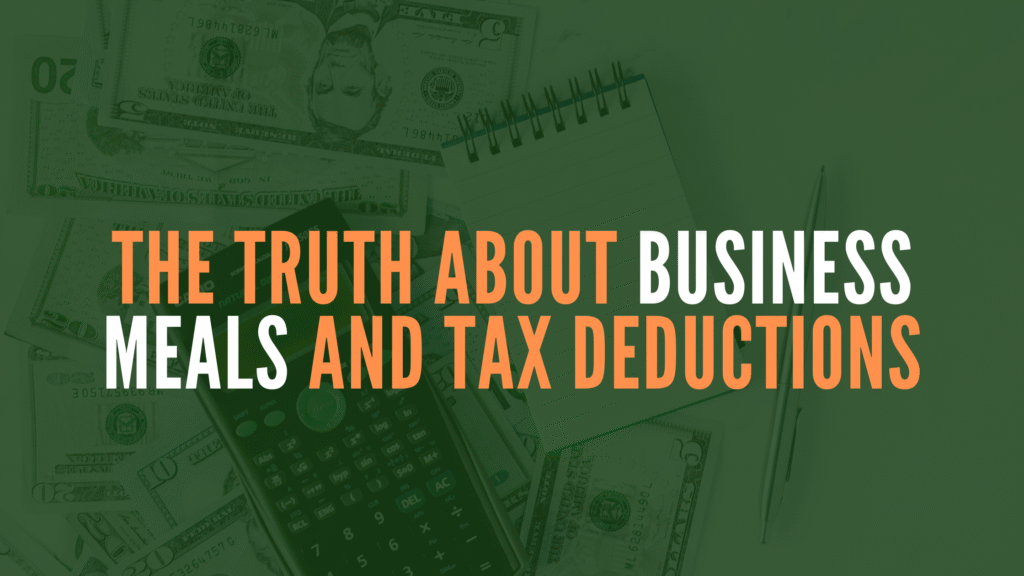As a business owner, it’s essential to understand how tax laws treat business meals, especially with the complexities surrounding personal and business meal deductions.
The Contradiction in the Tax Laws: Personal vs. Business Meals
As you may already know, there’s a well-known contradiction in the tax laws when it comes to personal living expenses, specifically personal meals and business meal deductions. The confusion largely stems from what’s known as the “Sutter rule,” a tax principle that continues to shape how business meals are treated by the IRS.
What is the Sutter Rule?
The Sutter rule is named after Dr. Sutter, a taxpayer who lost his deductions for business meals due to a key aspect of the tax law. Dr. Sutter tried to deduct the cost of meals associated with his work, such as his chamber of commerce lunches and board meetings at the hospital. However, he was unable to deduct these expenses because the cost of his business meals did not exceed the cost of his personal meals.
The IRS applied the Sutter rule without a clear and consistent standard, generally focusing on cases where it believes there’s been abuse of the business meal deduction—usually when there’s a disproportionately high number of business meals being claimed. One interesting note is that the IRS has only applied this rule to in-town business meals, not to meals consumed while traveling for business.
Building Your Defense Against the Sutter Rule
Given the somewhat ambiguous nature of the Sutter rule, it’s essential to build a defense strategy to ensure that your business meal deductions are secure. This involves two key elements: logic and legislation.
- The Logic Defense. The logic defense requires you to demonstrate that your business meals are genuinely more expensive than your personal meals. The IRS is more likely to challenge business meal deductions when they feel they are disproportionate to the cost of your personal meals. Showing that your business meals are above and beyond the usual personal expenses can help strengthen your case.
- The Legislative Defense. The legislative defense refers to the changes made to business meal deductions by lawmakers. Initially, business meal deductions were allowed in full, but over time, lawmakers reduced them to 80 percent and later to 50 percent. This reduction accounts for the personal benefit derived from these meals, acknowledging that business meals often have an element of personal enjoyment.
How to Ensure Your Meal Deductions Are Properly Documented
To ensure that your business meal deductions are accepted by the IRS, it’s crucial to keep thorough records. Here are the key pieces of documentation you’ll need:
- Receipts: Always keep receipts showing the food and drinks consumed.
- Proof of Payment: This can be a credit card receipt/statement or a canceled check.
- Names of the People Involved: Keep track of the names of the individuals with whom you had the meal. For example, if you’re dining with a client, make a note of their name.
- Business Reason for the Meal: It’s important to have a clear business reason for the meal, such as discussing a project, maintaining a client relationship, or conducting a business meeting.
Example of Proper Documentation
Let’s walk through an example:
You and a client, Harry Smith, go out for a Dutch-treat dinner that costs you $100. To ensure you can deduct your half of the meal, you need to:
- Keep the receipt that shows the food and drink purchased.
- Keep the second receipt that shows the $100 charge to your credit card.
- On the receipt, note: “Harry Smith, client, $100 (my half), maintain relationship.”
In this scenario, you didn’t have to pay for Harry’s dinner to deduct your own. You simply need to demonstrate that there was an ordinary business reason for having the meal. But, remember, both Dutch-treat meals (where each person pays for themselves) and meals where you pick up the entire tab may still face scrutiny under the Sutter rule.
Understanding the Sutter rule, knowing what triggers it, and building a solid defense are key to successfully managing your business meal deductions. Proper documentation is your best defense against challenges from the IRS.
If you’d like to discuss the Sutter rule or need help ensuring your business meal deductions are in good standing, I’m here to help. Please feel free to call me directly at 480 355-1398 to talk through your specific situation.

